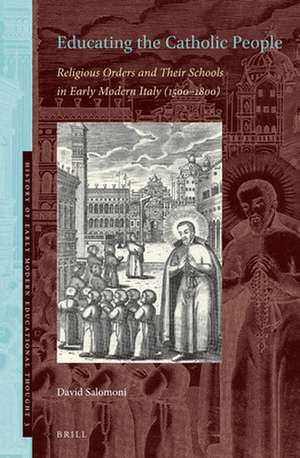Educating the Catholic People: Religious Orders and Their Schools in Early Modern Italy (1500–1800): History of Early Modern Educational Thought, cartea 3
Autor David Salomonien Limba Engleză Hardback – 23 iun 2021
Preț: 707.14 lei
Preț vechi: 862.37 lei
-18% Nou
Puncte Express: 1061
Preț estimativ în valută:
135.35€ • 147.07$ • 113.77£
135.35€ • 147.07$ • 113.77£
Carte disponibilă
Livrare economică 31 martie-14 aprilie
Livrare express 14-20 martie pentru 106.91 lei
Preluare comenzi: 021 569.72.76
Specificații
ISBN-13: 9789004436466
ISBN-10: 9004436464
Dimensiuni: 155 x 235 mm
Greutate: 0.48 kg
Editura: Brill
Colecția Brill
Seria History of Early Modern Educational Thought
ISBN-10: 9004436464
Dimensiuni: 155 x 235 mm
Greutate: 0.48 kg
Editura: Brill
Colecția Brill
Seria History of Early Modern Educational Thought
Cuprins
List of Maps
Introduction
1 State of Research and Historiographical Problems
1 Educating the Modern Catholics?: Roots of Catholic Schools in Renaissance Italy (15th–16th cc.)
1 The Last Phase of Communal Education in Italy
1.1Complexity of the Renaissance Communal School System
1.2Weaknesses of the Renaissance Communal School System
2 The Catholicization of Italian Education
2 Historical Paths: The Definition of Pedagogical Identities (16th–17th cc.)
1 Male Religious Orders
1.1An Educational Benchmark: The Jesuits
1.2The Barnabites
1.3The Somascans
1.4The Piarists
1.5The Theatines and the Servites
2 Female Religious Orders
2.1The Ursulines
2.2The Angelic Sisters and the Guastalla College
2.3Rosa Venerini and Lucia Filippini: The Pious Teachers
3 Schools and Colleges: Processes of Settlement in Italy and Contiguous Areas
1 From Lombardy to the Kingdom of France
2 Schools for Northern Italy and Small Towns
3 A Congregation for the Large Cities
4 Between Central, Southern and Eastern Europe
5 The Franciscans between Continuity and Rupture
4 Different Types of Schools Operated by Religious Orders
1 Public Education Entrusted to Religious Orders and Secular Priests
1.1Udine and the Barnabites: On the Outskirts of the Peninsula
1.2Jesuits and Piarists in the Duchy of Modena: A Competition between Local Networks
1.3Guastalla: A Multi-layered Religious Education for the Community
2 Episcopal Requests
2.1The Somascans Between Schools and Diocesan Seminaries
3 Other Types of Schools Operated by Religious Orders
3.1Barnabite Schools Established by Notables and Aristocrats
3.2The Religious as Private Teachers
3.3Women, Nuns, Teachers: The ‘Educandato’ of Saint Charles
5 The End of an Educational Season: The Schools of Religious Orders between Scientific and Political Revolutions (17th–18th cc.)
1 The Scientific Culture: Religious Orders on the Eve of Modernity
1.1Famiano Michelini and the Galilean Piarists
1.2Baranzano Redento
2 School Reforms in the Age of Enlightenment
2.1The European Situation
2.2The Situation in Italy: The Italian States and the Religious Orders
3 Conclusion
Bibliography
Index
Introduction
1 State of Research and Historiographical Problems
1 Educating the Modern Catholics?: Roots of Catholic Schools in Renaissance Italy (15th–16th cc.)
1 The Last Phase of Communal Education in Italy
1.1Complexity of the Renaissance Communal School System
1.2Weaknesses of the Renaissance Communal School System
2 The Catholicization of Italian Education
2 Historical Paths: The Definition of Pedagogical Identities (16th–17th cc.)
1 Male Religious Orders
1.1An Educational Benchmark: The Jesuits
1.2The Barnabites
1.3The Somascans
1.4The Piarists
1.5The Theatines and the Servites
2 Female Religious Orders
2.1The Ursulines
2.2The Angelic Sisters and the Guastalla College
2.3Rosa Venerini and Lucia Filippini: The Pious Teachers
3 Schools and Colleges: Processes of Settlement in Italy and Contiguous Areas
1 From Lombardy to the Kingdom of France
2 Schools for Northern Italy and Small Towns
3 A Congregation for the Large Cities
4 Between Central, Southern and Eastern Europe
5 The Franciscans between Continuity and Rupture
4 Different Types of Schools Operated by Religious Orders
1 Public Education Entrusted to Religious Orders and Secular Priests
1.1Udine and the Barnabites: On the Outskirts of the Peninsula
1.2Jesuits and Piarists in the Duchy of Modena: A Competition between Local Networks
1.3Guastalla: A Multi-layered Religious Education for the Community
2 Episcopal Requests
2.1The Somascans Between Schools and Diocesan Seminaries
3 Other Types of Schools Operated by Religious Orders
3.1Barnabite Schools Established by Notables and Aristocrats
3.2The Religious as Private Teachers
3.3Women, Nuns, Teachers: The ‘Educandato’ of Saint Charles
5 The End of an Educational Season: The Schools of Religious Orders between Scientific and Political Revolutions (17th–18th cc.)
1 The Scientific Culture: Religious Orders on the Eve of Modernity
1.1Famiano Michelini and the Galilean Piarists
1.2Baranzano Redento
2 School Reforms in the Age of Enlightenment
2.1The European Situation
2.2The Situation in Italy: The Italian States and the Religious Orders
3 Conclusion
Bibliography
Index
Notă biografică
David Salomoni, Ph.D. (2017, University of Rome III and Université d’Avignon) is post-doc researcher for the ERC project “Rutter: Making the Earth Global” at the University of Lisbon, Portugal. He has published monographs and articles in the fields of history of education and science, history of religious orders, gender studies, and social and political history of pre-modern Italy. In 2017 he was awarded the Galileo Galilei prize for young scholars by the Rotary International.




